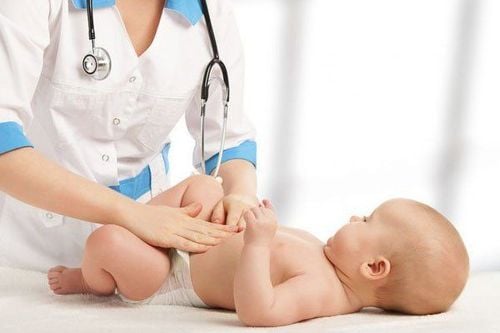This is an automatically translated article.
Neonatal colic refers to cases in which an infant cries more than usual without finding any other pathological or physiological cause. Mainly, we recognize the condition of an infant with colic through the baby's crying and limb movements.
1. Why do babies colic?
A normal baby will cry up to 2 hours a day, but when a baby has colic it can make the baby cry for more than 3 hours. This condition can be caused by a number of reasons from the child's diet or even in some cases no cause can be found.
Some possible causes of colic in babies include:
Colic syndrome : The syndrome can cause colic in about 20% of babies. Some doctors find this condition to have a rule of 3 as predominant, starting at 3 weeks old and crying for more than 3 hours a day, more than 3 days a week. Many researchers have shown that this syndrome is related to gas in babies, because the baby's gastric or pyloric sphincters are not working properly, making it more difficult to escape air in the abdomen. Gas stasis makes children feel uncomfortable, poor digestion of food leads to abdominal pain, fussiness. Poor digestion or inability to digest milk proteins: Usually this condition is caused by babies using formula c. Sometimes it is also possible that the food in the mother's diet makes breast milk difficult for the baby to digest. Lactose intolerance: The amount of lactose in breast milk or formula milk is high, so the baby's body does not have enough enzymes to digest all the new lactose sugar that is loaded into the body. Imbalance of intestinal microflora: Newborns have an incompletely developed intestinal microflora, so they are vulnerable to many factors such as medication and food. In particular, children who have to take antibiotics easily make the intestinal microflora more disturbed. Weaning too early: Children should start eating solid foods when they are 6 months old, if eaten too early, their digestive system has to come into contact with unsuitable foods, undigested food remains and ferments in the sugar. The intestines form gas, which is uncomfortable for the child. The gap between meals is too close or eating too full makes the baby's digestive system not have enough room for food. Unsecured baby food: Give your baby milk that has been stored for a long time, is contaminated with bacteria or has been spoiled. Because babies can cry due to many other reasons such as hunger, heat, cold, feeling wet and uncomfortable... when these solvable causes are excluded, it is possible to think of babies crying because stomach ache.

Có nhiều nguyên nhân có thể dẫn tới đau bụng ở trẻ sơ sinh
2. How to know the child has colic?
Newborns can't talk yet, so the only language to express their wishes is through different cries. We can recognize an infant with colic through a number of symptoms such as:
Through the baby's cry: Babies often cry very loudly, screaming like they are in pain and crying for a long time. The time when babies cry often at the same time of day, most often in the late afternoon and evening. When a baby cries despite the comfort of parents, it is very difficult to stop the crying. The child can be seen clenching his fingers, arching his back. Palpating the abdomen can see that the abdomen is distended or hard, the child's limbs are alternately bent towards the abdomen. A baby's crying often starts and ends abruptly, which is one of the ways to tell if your baby has colic. Usually babies will stop crying after passing stools. Abdominal pain caused by children with bloating may add some signs such as children belching, vomiting after eating, abdominal distension, frequent bowel movements, difficulty sleeping ...
3. What to do when the child has colic?
When seeing an infant showing signs of colic, parents can help relieve the child's discomfort by some measures such as:
Gently massage the child's belly in a clockwise direction. This helps promote gas in the digestive tract to pass out. Especially after breastfeeding or formula feeding, you should massage your baby.. Move your baby's legs like riding a bicycle. Helps to increase gastrointestinal motility, pushing gas out faster. Hold your baby rocking gently to make them feel more comfortable, or put them in a rocking crib. Giving your baby a bath with warm water will help soothe his or her discomfort. Some cases may require medical intervention. When experiencing one of the following problems, the child should be taken to the doctor:
The child is crying and accompanied by a fever. If a child under 3 months old has signs such as abdominal pain but is accompanied by a fever, it is necessary to take the child to the doctor because it is possible that the child has a gastrointestinal infection. If the baby cries continuously for more than 2 hours, do not stop and apply measures that do not improve. Children can not eat, vomit a lot, have loose stools full of water or bloody stools. Children do not gain weight. Children over 4 months of age are still showing signs of colic. Parents are afraid that they will hurt or lose their temper with their children when they cry.

Đau bụng ở trẻ sơ sinh cũng là một tình trạng hay gặp
4. How to prevent colic in babies
We still don't know all the causes of colic in babies. However, parents can apply some measures to relieve symptoms of known causes such as:
It is important to note the correct breastfeeding position to avoid more gas in the baby's abdomen. Correct sucking position is when breastfeeding, keep the baby's head higher than the stomach to make it easier for milk to flow down to the stomach, reduce the swallowing of air and easier to burp. Burp the baby after eating milk: The burp movement will help the baby push the gas in the stomach out. The method is quite simple, the mother should let the baby rest his head on her shoulder or lie face down on her lap or hand and then gently pat the baby's back with her other hand. Supplementing probiotics for children: One of the causes of abdominal pain is due to intestinal microflora disorders. Probiotics can reduce digestive disorders, reduce bloating. Adjust the appropriate amount of milk: Depending on the age to calculate the appropriate amount of milk, avoid giving the child too much to cause discomfort to the child. Thus, colic in infants is also a common condition. To recognize this condition, parents need to pay attention to the way the baby cries, the expressions on the baby's body. If you feel worried and unsure, you should take your baby to a medical facility for an examination and an accurate diagnosis.
Please dial HOTLINE for more information or register for an appointment HERE. Download MyVinmec app to make appointments faster and to manage your bookings easily.













